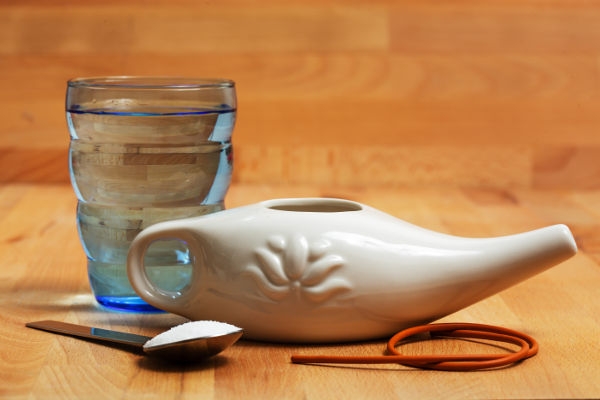Nasal Irrigation as an alternative treatment
Nasal irrigation is one of the most common alternative treatments for sinusitis symptoms. In a desperate attempt to find relief, more than a few people try rinsing their nasal cavity with water or saline solutions to unclog their nasal passages and kill the pain affecting the paranasal area. Among the different devices available on the market, Neti pots, originally from the Hindu practice of Ayurveda, seem to have gained popularity in the last few years. Their advocates speak wonders about keeping the symptoms at bay, but to what extent are Neti pots reliable to combat acute or chronic rhinosinusitis? Let’s find out!
All About Neti Pots
At this point, you probably know what we are talking about. Normally, it just takes to fill such teapot-shaped devices with lukewarm water and a spoon of salt to start using them, though the procedure may feel a bit awkward; people generally have to tilt their head at a 45-degree angle, put the spout into the top nostril and let the liquid flow through the nose and out the other nostril. In theory, this should help thin the mucus and flush it out the nose to alleviate the symptoms, but trials have shown different outcomes depending on the patients’ conditions.
For instance, although nasal douching has proven to be helpful in children with acute sinusitis, it doesn’t have the same effect in adults under the same circumstances. In a recent study published in the Canadian Medical Association Journal, researchers found that daily nasal irrigation has a significant impact on treating symptoms such as nasal blockage or loss of smell, but such improvement tends to be limited to a six-month period, after which symptoms may come back with a vengeance.
Does it works?
Based on current data, nasal douching can supplement other therapies in patients with chronic sinusitis, but, again, different factors can affect the treatment response. Such is the case of people with nasal polyps or those who have undergone sinus surgery, as they could deal with a harder sinus penetration of the fluids.
Besides, regular Neti pot users can also experience nasal irritation and even nosebleeds, though the latter only occurs in a small percentage of the cases. However, what you should really care about when using Neti pots are hygienic measures. Cleaning the device after use is key to preventing bacterial infection. Still, experts recommend using previously boiled, distilled, or sterile solutions to avoid any potential risks related to contaminated water, like Naegleria fowleri, the so-called brain-eating amoeba (there are reported deaths from primary amoebic meningoencephalitis due to nasal irrigation).
All in all, there are still some doubts on whether Neti pots and other nasal irrigation devices are a solid answer to sinusitis problems. We can’t forget that despite helping thin the mucus, Neti pots don’t drain the thick secretions from the sinuses, which account for most of the symptoms.
It may not hurt to give Neti pots a try, especially as a compliment and for a short period of time, but if they don’t do the trick, don’t be taken aback!








